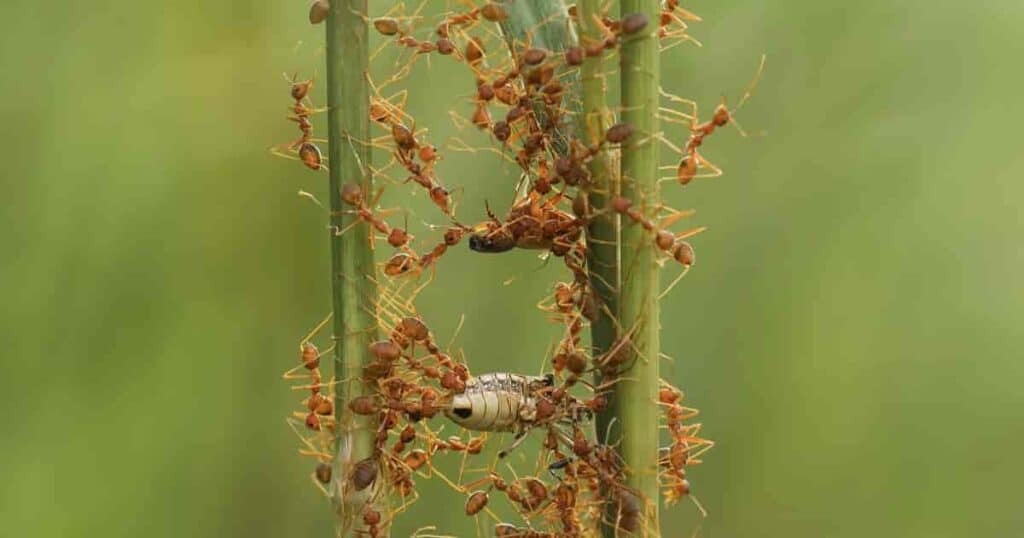If you have ants in your plants, you can find many references to using cinnamon to repel them. Save your cinnamon for your apple pie. Using cinnamon to get rid of ants is a myth.
Can you get rid of ants in potted plants with cinnamon? No.
Cinnamon powder is not potent enough, and it’s not possible to introduce a high enough concentration of cinnamon essential oil into a potted plant to kill ants without harming your plant.

However, there are other natural methods to use to get rid of ants in plants.
Is Cinnamon An Effective Ant Repellent Or Insecticide?
A Cornell study explores the effects of cinnamon essential oil on various organisms. A cinnamon essential oil can deter some insects, but the list does not include ants. Unfortunately, it also kills bees. [source]
Another group of researchers from Universiti Teknologi MARA Perlis studied whether cinnamon essential oil could be an effective ant repellent or insecticide.
When they increased the concentration of cinnamon essential oil in their medium to 20% percent, the mixture repelled ants consistently for an hour.
However, at lower concentrations, cinnamon oil stopped repelling ants after 30 minutes.
The study further showed that a 20% cinnamon essential oil mixture killed all ants exposed to it for at least 90 minutes.
Using cinnamon essential oil initially sounds promising. However, using cinnamon oil inside your pot is not advisable since you’d need the soil to be 20% percent cinnamon essential oil to be effective.
You cannot get rid of ants in potted plants with cinnamon because the quantity necessary is neither practical nor healthy for your plant. Cinnamon can however mess with their scent trails.
Can Cinnamon Harm Plants?
The same Cornell study mentioned above states that cinnamon essential oil can have a phytotoxic effect on plants. That means that cinnamon can be toxic to plants and affect plant growth.
While cinnamon essential oil has antibacterial and antifungal qualities, these certainly wouldn’t balance out the type of stress your plant could experience from being dosed with large quantities of cinnamon essential oil.
What Should I Do If I Find Ants in My Potted Plant?
The first thing you should do when you find ants in a potted plant is to take the pot and plant outside so that the ants don’t further infest your home.
If you have a larger plant with an entire colony living inside, you will want to either kill or relocate the colony.
How Can I Get Rid of Ants in Potted Plants Naturally?
I’ve had multiple infestations of ants and never had any luck whatsoever deterring ant infestations with cinnamon. However, there are several natural solutions to get rid of ants in potted plants.
Borax
The only effective natural method I’ve personally used to get rid of ants involves killing as many as possible with sodium borate, an alkaline mineral salt commercially sold as Borax.
Borax disrupts ants’ digestive systems and eventually kills them. Some ants will drink long enough that they die drinking. However, worker ants also bring Borax back to the colony for other ants, including the queen, to ingest.
More on Using Borax in The Garden
The best recipe I’ve used is to mix three parts sugar to one part Borax, combined with just enough warm water to make a syrup. You will want to put the mixture in shallow dishes near (not in) your potted plant.
Diatomaceous Earth
The University of California Agriculture and Natural Resources suggests using diatomaceous earth (DE) to kill ants.
When ants walk through DE, electrostatic attraction causes the dust to cling to them. It abrades the waxy coating on the ant’s exoskeleton and eventually causes the ant to dehydrate.
Food Grade Diatomaceous Earth is safe to use on all plants. You can sprinkle it directly on top of dry soil in your pot.
Be sure to follow package directions and use goggles, masks, and gloves when handling them because they can irritate the skin.
Other natural solutions include:
- Used Coffee Grounds
- Soapy Water
- Insecticidal Soap
- Pyrethrum Spray
- Plants that Repel Ants
Repot the Plant
If you want to relocate the ants instead of killing the colony, you can remove them and repot your plant following these steps:
- Remove your plant from the dirt.
- Relocate the remaining dirt and ants elsewhere in your yard.
- Spray the plant roots with water to remove any remaining ants.
- Bleach the inside and outside of the pot with a 1:10 solution of bleach and water, and then rinse well. Bleaching will remove ant pheromones from the pot so that the ants won’t come back. Also, wipe down the area surrounding the flowerpot.
- Repot your plant with fresh soil.